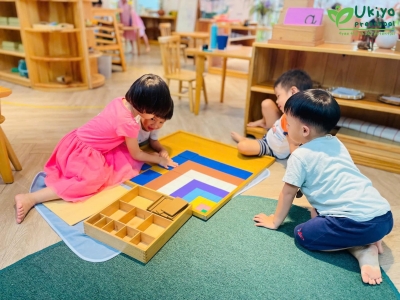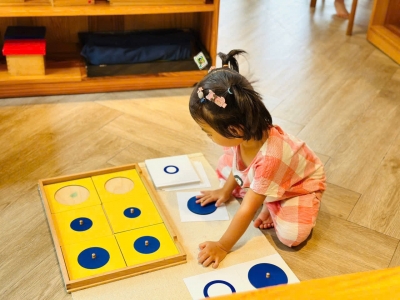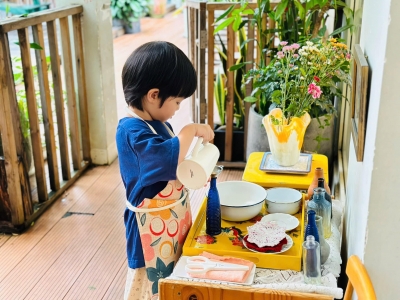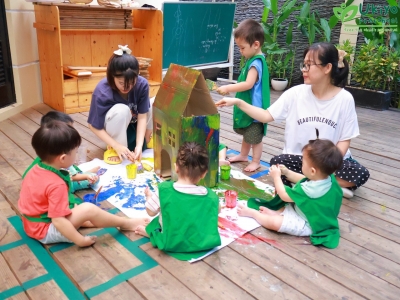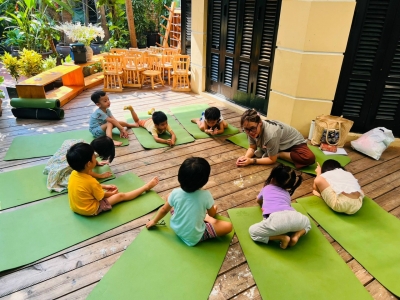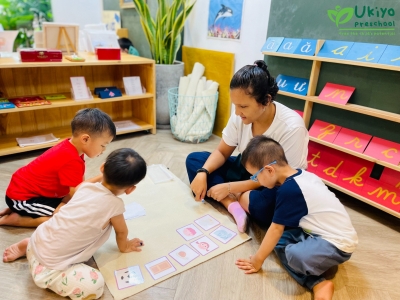THE NEW METHOD IN EDUCATION
To understand the needs of the child and to supply these so that his life develops fully, that is the aim underlying my method.
We give the child nourishing food so that his little body may grow, and in just the same way we must provide him with suitable nourishment for his mental and moral growth. Just as we cannot directly help his body to grow into manhood, so we cannot form his mind or character for him. But we can supply his mental needs as we supply his bodily ones and both should be treated in an equally scientific way.
During many years of experiment and observation, I discovered that children learn naturally through activity, and that their characters develop through freedom. But these are general principles, which require practical application, and the Montessori materials have been evolved to meet this need. These principles are in direct opposition to the old idea that a child should sit still while he is being taught, and that all his movements should be under the supervision of a teacher. Neither have they anything in common with the schools where everything is done for the children, faces washed, aprons put on, spilt food cleared up, rest hour determined by the clock, and lessons and games organized according to a fixed time table.
In Montessori schools it is the children who do these things for themselves. They are not taught by a teacher in the accepted sense of the word – the teacher is there rather as an observer and helper. She shows the child how to use the materials, how to wash himself, but it is the child who handles the material, perfects himself in his exercise, and keeps his face clean of his own accord. Thus he is both active and free, and from these two factors is created that vital quality of a strong character: internal discipline.
Let us suppose that a child of three or four comes to one of our schools while he has not yet attained this quality. There are signs by which this can easily be discovered. In the first place his movements are clumsy – fundamental muscular coordination is lacking. Now it is not the slightest use to try and counteract this with minute corrections. He requires an education which delicately coordinates the finer movements. It is precisely to meet this need that we have in our schools child-sized furniture, light to move and bright in color. If the child is clumsy he knocks things over, makes a noise and soils the pretty paint. This makes him more careful and he soon learns to move his chair without making the least noise, to clean the paint carefully with soap and water. As he learns to handle the materials carefully his delight grows, and eventually he can be trusted to dust the cupboard with the fragile glasses inside. There is no need to worry about his ungainly movements, his screaming and clumsiness now, they will vanish of their own accord.
A second characteristic that always accompanies this lack of muscular coordination is the difficulty and sometimes complete incapacity shown by the child of focusing his attention on real things. He prefers to live in the world of his imagination; he would rather give a fairy banquet with a few leaves and pebbles than explore the real world around him.
Unfortunately, this characteristic is often misunderstood by parents, who believe that it is the sign of a remarkable imagination, the budding of artistic genius perhaps. On the contrary it is a method of escape from reality, one which disintegrates the character. When the child is eagerly fixing his attention on the world about him, only then will his imagination have a safe foundation. The teacher who succeeds in interesting a child, say in laying a real table, serving a real meal, will recall the wandering mind. And this coordination of the fine movements together with the recall of the wandering attention to reality will be the only remedy needed. Once the power of concentrating the mind on real things is acquired, the mind will be restored to health and will function normally.
The third characteristic is a tendency towards imitation. In children over two years, this is a sign of great weakness. It indicates a will that has not prepared its instruments or found its course, but follows others. It is here that the specially designed material plays an important part. From three to six years, children have a real ‘sense hunger’, they love to touch things, to fit different shapes together, to grade colors and musical sounds. The material is carefully gradated to satisfy the child’s every need, and once the child has fixed his attention, he becomes a little individual, no longer an imitator. Children of three or four will concentrate for an hour at a time without effort, and we are careful not to destroy this new power by the arbitrary demands of a fixed timetable.
Through this concentration important qualities of character develop. When the concentration passes, the child is inwardly satisfied, he becomes aware of his companions in whom he shows a lively and sympathetic interest. His own spiritual satisfaction makes him gentle and affectionate and particularly sensitive to beautiful things. From his detachment in his work develops perseverance, a capacity for unremitting work, he learns obedience in a perfectly natural way without the least pressure, because he himself wants to do what is right, to use the material as it should be used. When he is finished he is eager to share his joy, to help the little ones, and because the others have respected his work he never thinks of interfering with those who are still at work.
Surely these are invaluable moral and social qualities. There is no punishment or reward in our schools to interfere with the joy in the work itself. The only reward is in the completion of the work – it is at this time that internal discipline establishes itself, and the foundations of character are laid.
How much I would like to tell you more of the children and their work, how as they get older and begin to use more and more materials, they learn numbers and to write and read, all with the same ease and joy. And particularly how many backward children have been brought up to normal standards by this method of understanding the child’s needs, and supplying him with the means of developing his own individual mind and character.
But I have said enough if I have persuaded you to undertake for your- self the interesting experiment of a visit to one of our schools to watch the happy little ones at work.
(From Maria speaks to Parents book)
Others



